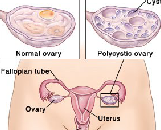
Polycystic ovary syndrome (PCOS) is a set of symptoms due to elevated androgens in women. Signs and symptoms of PCOS include irregular or no menstrual periods, heavy periods, excess body and facial hair, acne, pelvic pain, difficulty getting pregnant, and patches of thick, darker, velvety skin. Associated conditions include type 2 diabetes, obesity, obstructive sleep apnea, heart disease, mood disorders, and endometrial cancer.
Rodents are the most economical and widely used animals to study PCOS and ovarian dysfunction. The model chosen to study the development of PCOS and other metabolic parameters remains dependent on the specific etiologic hypotheses being investigated.
Organism species: Mus musculus (Mouse)
| CATALOG NO. | PRODUCT NAME | APPLICATIONS | |
| Models | n/a | Model for Polycystic Ovarian Syndrome (PCOS) | Disease Model Customized Service Offer |
| Tissues | n/a | Tissue of Polycystic Ovarian Syndrome (PCOS) (If Necessary) | Tissue Customized Service Offer |
| Serums | n/a | Serums of Polycystic Ovarian Syndrome (PCOS) (If Necessary) | Serums Customized Service Offer |
Organism species: Rattus norvegicus (Rat)
| CATALOG NO. | PRODUCT NAME | APPLICATIONS | |
| Models | DSI546Ra01 | Rat Model for Polycystic Ovarian Syndrome (PCOS) | Disease Model |
| Tissues | TSI546Ra31 | Rat Ovary Tissue of Polycystic Ovarian Syndrome (PCOS) | Paraffin slides for pathologic research: IHC,IF and HE,Masson and other stainings |
| Serums | n/a | Serums of Polycystic Ovarian Syndrome (PCOS) (If Necessary) | Serums Customized Service Offer |
